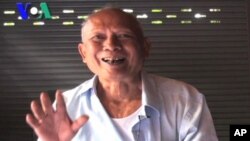Taking up a defense that Khmer Rouge tribunal investigating judges have already alluded to, atrocity crimes suspect Meas Muth said in a recent interview that accusations against him by prosecution fall out of the mandate of the UN-backed court.
Investigating judges Siegfried Blunk and You Bunleng said in a statement earlier this month that they have doubts about whether five suspects named by prosecutors for potential indictments fall under the court’s mission to prosecute those “most responsible” for Khmer Rouge atrocities.
Meas Muth was recently named as a suspect by the Christian Science Monitor and on the New Zealand website Scoop. Scoop published introductory submission documents by prosecutors in the court’s Case 003 that were also obtained by VOA Khmer.
According to the prosecution, Meas Muth was the secretary of Division 164 of the Khmer Rouge military and was a member of the regime’s central committee or an assistant central committee, which included military and political party responsibilities. Prosecutors say this put him in the “superior echelons” of the regime, since only the Standing Committee was higher.
Prosecutors say Meas Muth and another suspect, Sou Met, were responsible for crimes including “forced labour, inhumane living conditions, unlawful arrest and detention, physical and mental abuse, torture and killing.”
This included crimes associated with Tuol Sleng prison, known as S-21, an execution site in Stung Tauch, the construction of the Kampong Chhnang airfield, and purges in the Central, New North and East zones. This also included crimes associated with S-22 Security Center, the Wat Eng Tea Nhien Security Center, the Stung Hav rock quarry, the navy, and other security centers, as well as in armed conflict against Vietnamese forces.
Meas Muth was in charge of the navy, along with his other duties, in today’s Preah Sihanouk and Kampot provinces. Prosecutors say he was responsible for purges in areas under his command, that he sent hundreds of people to S-21, and oversaw the forced labor site at the Stung Hav rock quarry.
From June 1975, the prosecution wrote, Meas Muth and Sou Met, “were senior leaders during the Democratic Kampuchea period and / or persons most responsible for the crimes described.”
Now 71, Meas Muth lives in Samlot district, Battambang province. In an interview in July, he told VOA Khmer any accusations against him were not legal under the rules of the court. He said that the court should not try more than the five Khmer Rouge leaders currently in custody and warned against instability if more cadre are indicted.
“The law is limited” to the five, he said. “If more is done beyond that figure, what happens to the law?”
“Second, if it does more, how will that impact affairs of national security?” he asked. “It impacts others, because the Khmer Rouge was not just a few people. It was a lot, inside, outside, near and far.”
Former Khmer Rouge soldiers are now guarding the frontier, he said, where there is a prolonged military standoff with Thailand.
He said the case against him, as well as another, Case 004, are not against those “most responsible,” a key consideration for the court.
“Now the senior-most leaders and the most responsible persons are at the court already," he said, referring to Tuol Sleng prison chief Duch, who was tried in 2009, and Nuon Chea, Khieu Samphan, Ieng Sary and Ieng Thirith, who are expected to face a full trial later this year.
The prosecution, however, is seeking his indictment for tens of thousands of killings. According to the introductory submission, Meas Muth, had regular contact with senior leaders and sent prisoners to S-21, which led to their executions.
The submission is now with the investigating judges, who must determine whether Meas Muth and others should be indicted and brought to trial. Critics say the judges have not done enough to investigate, and some tribunal experts worry cases 003 and 004 will not be prosecuted because they are opposed by Prime Minister Hun Sen and other current political leaders.
Meas Muth denies the accusations of the prosecution, although he said the “General Staff” would send people to S-21. Division leaders like himself “did not know the problem.”
In his division, “there were a few cases” sent to S-21, he said.
“The courts should know the origin of the Khmer Rouge,” he added. The Khmer Rouge were born of the US-backed coup that toppled then-prince Norodom Sihanouk, who then encouraged Cambodians to fight to reseat him, Meas Muth said.
“So the source and the main master of the Khmer Rouge was first the US, and second, Samdech Euv,” he said, using the Khmer honorific for monarch.
“If there was no appeal from Samdech Euv for his children to ‘go to the jungle,’ to resist, there would be no Khmer Rouge,” he said. “The full story is that.”
“If they just try the mid-level [cadre],” he said, “that seems not really right.”




